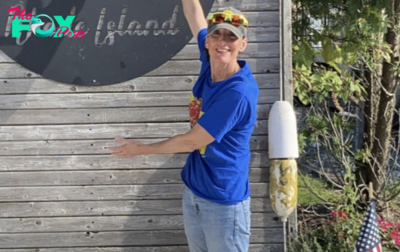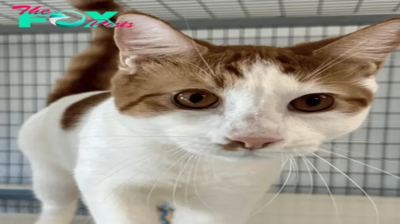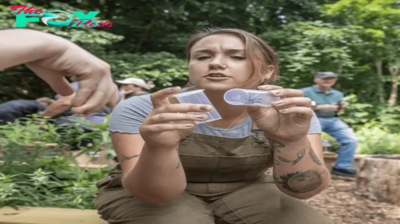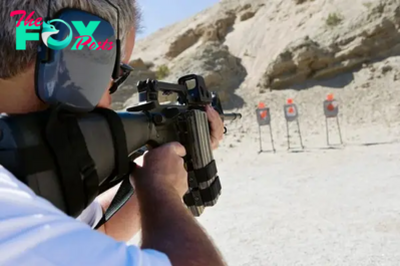Health
Read With Us: CITY LIFE – a book by Michael Morse – Chapter 14
by Michael Morse, contributing writer
Chapter 14 – October – Pedestrian Struck
The guys from Ladder 8 were cleaning her head wound and getting ready to apply a cervical collar when we arrived on scene. A good amount of blood spattered the ground and the victim’s clothing. She was awake but stunned, sitting in the road in front of an older Toyota.
You never know what to expect when dispatched for a pedestrian struck. The injuries could be life threatening, disfiguring, or extremely painful. Broken bones, lacerations, and concussions are common. This patient didn’t look to be hurt too badly. She didn’t lose consciousness and there were no gross deformities. The only problem I could see was the head injury. There was no damage to the Toyota.
We put her on the spine board and loaded her onto the stretcher, then into the rescue. She had just stepped out of her car when she was hit. As Veakro checked her vitals I gathered the necessary information.
“I don’t have insurance,” she said, worried.
“Don’t worry, the person who hit you will have insurance, they’ll pay the bill.”
“Bicycle riders need insurance?”
I looked out the side window of the rescue. Next to her Toyota a bicyclist talked to the police, his front tire bent.
You never know what to expect.
Flashback
Desperate people sometimes do desperate things. A thirty-year-old guy with a drug problem found a new way to feed his habit. The high-voltage power lines that bring electricity from the power plants up north are secured in place by guy wires. The material is expensive, even as scrap metal.
Somehow, one of the guy wires let loose and contacted the live wires, electrocuting the man trying to steal them. Neighbors heard the “pop” and saw the flash from a half mile away. He tried to crawl up the embankment to get help after trying his cell phone, only to find it had melted. Somebody called 911.
I was at Rhode Island Hospital talking to Jeff Davenport, who was detailed in charge of Rescue 2 for the day. My truck wasn’t ready; Rescue 2 took the call as I listened on the radio. Lieutenant Mike Clark and Engine 12 were first on scene.
“Engine 12 to fire alarm, we have a young adult with third-degree burns over 90 percent of his body, possible live wires in the area, have companies use extreme caution.”
Special Hazards arrived on scene and secured the area, the electric company was called in, Battalion 2 took over as the incident commander. I’m not sure how, but they got the patient away from the immediate danger and into Rescue 2. His skin had melted. Matt, Rescue 2’s chauffeur, told me later his uniform was covered with the patient’s skin.
If the patient has any chance of survival he owes it to the firefighters who responded. Woody from Ladder 1 spent eight or nine of his seventeen years on the job in the rescue division. Dave from Engine 12 is a skilled EMT C with extensive rescue experience. Lieutenant Clarke is an RN, Matt is a paramedic. Somehow they started an IV, kept the patients skin intact, provided oxygen, and got him to the trauma room at Rhode Island Hospital in about fifteen minutes.
This incident could have happened anywhere in the city, on any group at any time, and people with similar training and expertise would have responded. Everybody plays a part, everybody performs above and beyond what is considered by anybody’s standards exceptional. The people of Providence are well served by their firefighters.
I worked overtime at Rescue 2 that night. As I sat at the desk waiting for Jeff to return from another call I started to do some reports for him. The third one down had a familiar scent. I read the report; it was the burn victim’s, the smell of his flesh embedded into the paper. It was a haunting experience. Memories of incidents I thought long forgotten flashed through my mind as I got up and walked out of the room, looking for some fresh air.
Communication Breakdown
Just when I think I speak enough Spanish to get by, somebody throws me a curve.
0200 hours; an intoxicated man on Westminster Street. He’s a Guatemalan immigrant, pleasant enough, obviously inebriated and unable to find his way home. I thought he was too drunk to speak, turns out he is mute. He was a whiz at sign language; all the way to the hospital he signed messages to me.
I didn’t understand a word he signed.
Knuckleball
Just when I’ve got the curve figured out, somebody brings in the knuckleballer! 1130 hours, called for an unresponsive thirty-eight-year-old male. Arrived on scene and found a guy lying in bed, unconscious, unresponsive, respirations 6/minute, strong pulse, 110/72 with pinpoint pupils. Everything pointed toward heroin overdose.
I administered 2 mg Narcan IM immediately, had Jay assist ventilations as the guys from Engine 13 got ready to move him. We got him onto the stair chair and into the rescue in about four minutes. During that time he began to respond to the Narcan. His breathing improved but was nowhere near normal. He did open his eyes when I gave him a sternal rub. Jay continued to bag him, Steve and Veakro started an IV, and we gave him two more milligrams of Narcan. A minute later he was conscious but still not alert and unable to communicate with us. He still had trouble breathing and started to panic.
As we got ready to transport to Rhode Island Hospital, another man showed up. He couldn’t communicate either; he and the man on the stretcher were brothers, both born deaf and living together. Through rudimentary sign language and gestures we were able to put together some pieces of the puzzle as we rode toward the hospital.
A few hours later I looked in on them. The brother who had overdosed was intubated and in the intensive care unit, probably suffering with pneumonia as well as the aftereffects of the OD. His brother stood vigil outside the door, waiting for something good to happen.
Book Release
My friend Ann Martini from Wright Martini Media thought it would be a good idea to have a book release party when Rescuing Providence was published. Never one to pass on an opportunity for a party, I agreed. Not knowing what to expect, we planned for a few weeks. Ann’s husband, Michael, prepared the food, Brittany was the bartender, Danielle passed out hors d’oeuvres, Ann handled the million little details, and my wife, Cheryl, added her personal touch with a few dishes of her own as well as organizing the book signing part of things.
My thanks to them all for making it possible.
I am still overwhelmed with the outpouring of support from my family, friends, coworkers, and some new acquaintances. Well over a hundred people showed up. It was a gratifying, memorable, and ultimately humbling moment for me. Gaining and keeping the respect of those closest to me is not something I take lightly. It has given me a fresh perspective, no small amount of pride and accomplishment, and a great amount of satisfaction. For that I am truly thankful.
If everybody enjoys the book one tenth as much as I enjoy knowing them, I will consider it a success
Greatest Generation
He’s eighty-two, a WWII veteran, lying on the floor of his dirty one room apartment in Olneyville, his piss bag nearly full, his left arm broken. At some time during the night he fell out of his wheelchair and couldn’t get up. By the time we got there he was nearly delirious. Pain, dehydration and fear mixed together with loneliness and despair must have made for an awful night. We wrapped his arm the best we could, lifted him onto our stretcher, locked his door and took him away.
Ouch!

Nine-year-old kid, tough as nails. He fell out of a tree. Silver spoon fracture; must have hurt like hell. I would have been crying for my mamma!
–
Code Red!

Fire on Blain Street. Took our guys about twenty minutes to bring it under control. Great job!
Breeders
Yesterday a twenty-four-year-old, eighteen weeks pregnant person called 911 from just outside the parking lot of Women and Infants Hospital because she was nauseous. We were at Miriam Hospital, the other end of Providence. No other rescues were available, so we took the run. Traffic, road construction, and drivers who didn’t give a hoot that there was an emergency vehicle trying to get through contributed to a ten minute response time. We arrived on scene, helped the “patient” into the truck. She sat on the bench seat and projectile vomited all over the stretcher, floor, and my shoes. No warning or apology, or even the slightest remorse. Thirty seconds later we walked her into Woman and Infants Hospital, where she informed the triage nurse she “felt much better” now that she had vomited and didn’t need to be seen.
A few hours ago, another pregnant female felt pain in her side while at work. She called her family to come get her, the pain too much to bear. They drove to her place of employment, put her into their car, drove back to their home, past Women and Infants Hospital, and into their driveway. After helping her into their home, they called 911. When I asked why they didn’t take her to the hospital themselves, they indignantly informed me that by calling 911 they wouldn’t have to wait with everybody else in the waiting room. Her vitals were stable; we drove her to the hospital, where she joined everybody else. I asked the triage nurse if she could put her name behind the people who came in after her.
Another day breeding responsible citizens here in the capital city.
Lunchtime Disaster
He left his daughter’s home in Warwick at 11:30. They were going to have lunch together; Chinese takeout. At 12:30 his daughter called the Warwick Police, concerned that her diabetic father hadn’t returned. At 12:45 we received a call for a pedestrian struck by an auto. Approaching the scene I saw not one, but two separate incidents:
- A young man sitting next to his banged-up bicycle, holding his knees to his chest, and
- A mid-sized car that had driven through a chain-link fence and into the side of a brick building.
As we approached, Lieutenant Mahoney told me that the person in the car was more critical than the man next to the bike. He had already called for an additional rescue; I went to the car and took a look inside.
The driver was about seventy years old, sitting in the driver’s seat, no seat belt, and unconscious. A metal fence pole pierced the windshield, barely missing the driver’s head as it swept through the passenger compartment. The car tipped dangerously on its side. The guys from Engine 13 declared the scene safe, so me and Mark, my driver for the day, opened the driver’s side door and extricated the victim. He was unresponsive at first, and then started to struggle. There was no evidence of alcohol; I assumed it was a diabetic emergency. We got him into the rescue; vital signs, IV, oxygen, and a blood glucose test in about a minute. His glucose level was 40. An amp of D-50 later our patient had regained consciousness.
He told me he left his daughter’s house in Warwick to get some lunch at the Chinese takeout and couldn’t remember anything after leaving her driveway. He didn’t remember getting onto the highway, driving nearly ten miles, taking an exit into Providence, running down a guy on a bicycle, tearing through a fence, and smashing into a brick building. I found his cell phone in his pocket, saw seven missed calls from Monica. I hit the send button, Monica answered on the first ring. She was relieved that her dad was okay but concerned for the well-being of the man on the bicycle. Luckily, that guy was only shaken up.
We transported him to Rhode Island Hospital, one very lucky guy.
That Hurt!
Well, I’m feeling pretty darn good about myself. My party was a smashing success, the job is going well, my friends and family think I’m some big shot author, and my book is being displayed at Borders bookstore on the register table right next to one of my favorites, Bruce Springsteen’s newest CD.
I figured I would share my success with Megan, a very pretty twenty-four-year-old nursing student and Rhode Island Hospital employee.
“Me and Springsteen have something in common,” I told her after telling her about my book and its prominent spot at Borders.
“I know,” she said, dead serious. “You’re both old.”
It’s good to be back on earth. Thanks, Megan!
No Help
I learned what little Spanish I know because there was a need to communicate with my patients. It’s easy to say, “Speak English!” It’s not as easy when the person speaking Spanish is dying in front of you while their family looks on helplessly, unable to communicate. Simple phrases such as “what is your name, when were you born, where is your pain, how bad is it, when did it start, do you take medications, do you have allergies to medications” are easy to learn and help ease tension during an emergency.
If I can learn a little Spanish, there is absolutely no excuse for people living in this country not to make an attempt to learn some English.
Friday night, 0300. We got a call for a woman with chest pain. We arrived at her home, a well-kept one-story in a terrible neighborhood surrounded by an ornate fence, three $30,000 and up cars in front and in the driveway, marble tile floors, beautiful furniture and paintings, and a fifty-eight-year-old lady sitting on the couch clutching her chest, Five family members surrounded her. I tried to communicate with my limited Spanish; they made no effort to help. Four firefighters looked on as we tried everything to communicate with these people, but they couldn’t convey their message.
“What is your name?” I asked in Spanish. She did answer that.
“Are you in pain?” Yes.
“When did it start?” No answer there, just a lot of chatter from the family that I didn’t understand.
“Where are your medications?” You would think I asked them to recite the Constitution. Nobody moved.
After more noncommunication, I assumed she was having chest pain with a History of heart problems. She couldn’t stand up. We carried the woman to the truck, 350 pounds, five feet four inches. She carried on the entire time. The family followed us in one of their expensive cars.
We did an IV, gave her a nitro, aspirin, and oxygen, ran an EKG, and transported her to Rhode Island Hospital. There, a Spanish interpreter told us that the woman witnessed her daughter and her daughter’s boyfriend have an argument and she was upset. No chest pain, no History, just “upset.”
I was pretty upset myself. I think I’ll learn how to say that in Spanish.
Ortega Like the Sauce
“What happened?”
“Yo, like this bitch stone cold upped me.”
“She what?”
“My bike, bro, I’m chillin sho holed me up, bro.”
“What are you talking about?”
“I need medication, give me some Vicodin.”
“Are you nuts?”
“Take me home, bro, just give me some Vicodin.”
“I’m taking you to the hospital.”
“Yo, don’t go without my halfbelt, it’s flyin’ on the ground.”
Sure enough, there on the ground was half a belt. I always wondered how they kept their pants halfway on their body.
“What’s you name?”
“Emelio Ortega, like the sauce.”
“Have you been drinking, Emelio Ortega Like the Sauce?”
“Two beers, bro, I’m twenty-one. Just take me home, bro, I need some Vicodins and my crib, I’ll be chillin’.”
We took him to Rhode Island Hospital, where he tortured Kris and Ron for a while. I have no idea what his problem was other than he was riding his bike and “some bitch stone cold upped” him.
Stop Crying!
Ten months old, permanent brain damage from parental abuse. His mouth was covered in blood, a baseball-sized knot protruded from his forehead, another bruise formed below his eye.
“His father dropped him. Then he dropped him again.”
“He dropped him twice?”
“He’s been drinking.”
“Where is he now?”
“Sleeping.”
The baby was barely conscious, filthy diaper and a shirt that hadn’t seen the laundry in weeks. Renato held him still while I secured him in the “papoose.” Kids normally fight like mad when we try to restrain them, but Michael remained limp.
“Your story doesn’t add up,” I told the mother. She knew. Tears started.
“I have to get away from him,” she said between sobs.
Michael couldn’t cry. I think he was out of tears.
For the Birds
I was wondering what would possess a person who had been told earlier in the week not to take her child to an emergency room for his symptoms, which could be related to a disease-carrying bird that she had bought a week ago, then died and had been taken by the Rhode Island Department of Health for purposes I can only imagine, knowing that her two kids, herself, and her boyfriend were all ill and the home quarantined by the same Rhode Island Department of Health for more reasons I can only imagine, to call 911 because her son’s flu-like symptoms were not getting better.
These thoughts occurred to me while I was standing a foot away from the ill child in a ten-by-twelve-foot bedroom with the sick mom, sick child, and the sick child’s sick sister. The sick boyfriend lingered in the doorway. Joining the sick family now were four firefighters from Engine 8, who were called to the scene for a “child with difficulty breathing,” myself, and Matt, my partner for the night.
“The Department of Health said not to bring him to the emergency room because they don’t know what’s making us sick,” she said.
It was past midnight. The kid would survive, I’m sure, but I had to err on the side of caution. I put a mask over the child’s nose and mouth, put him in the rescue, and took him to Hasbro Children’s Hospital. The mom followed in her car.
Once at the ER, as I started to relay the information to the triage nurse, my radio interrupted the story—triple stabbing in Olneyville.
“Rescue 1 in service,” I said into the mic.
“Rescue 1, respond to Hulstead Street for a multiple stabbing, police on scene.”
“Rescue 1, on the way.”
I forgot about the dead bird and headed toward the stabbing.
___
To read Chapters 1-13 of CITY LIFE:

Michael Morse, [email protected], a monthly contributor is a retired Captain with the Providence Fire Department
Michael Morse spent 23 years as a firefighter/EMT with the Providence Fire Department before retiring in 2013 as Captain, Rescue Co. 5. He is an author of several books, most offering fellow firefighter/EMTs and the general population alike a poignant glimpse into one person’s journey through life, work and hope for the future. He is a Warwick resident.

-

 Health1d ago
Health1d agoTeens Are Stuck on Their Screens. Here’s How to Protect Them
-

 Health1d ago
Health1d agoHow Pulmonary Rehab Can Help Improve Asthma Symptoms
-

 Health1d ago
Health1d ago10 Things to Say When Someone Asks Why You’re Still Single
-

 Health2d ago
Health2d agoThe Surprising Benefits of Talking Out Loud to Yourself
-

 Health2d ago
Health2d agoDoctor’s bills often come with sticker shock for patients − but health insurance could be reinvented to provide costs upfront
-

 Health2d ago
Health2d agoHow Colorado is trying to make the High Line Canal a place for everyone — not just the wealthy
-

 Health3d ago
Health3d agoWhat an HPV Diagnosis Really Means
-

 Health3d ago
Health3d agoThere’s an E. Coli Outbreak in Organic Carrots



























